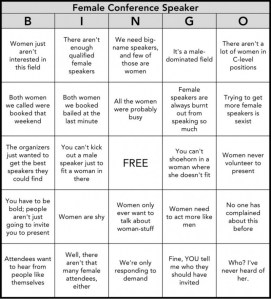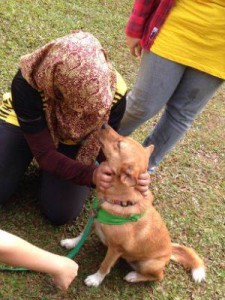Yesterday, we began a roundtable discussion with women who attended “Speaking in God’s name: Re-examining Gender in Islam”in London. Today, we’ll finish the conversation with Eleanor Kilory of Women Living Under Muslim Laws, Word Play of Word Play Blog, Basma Al Mutlaq of Saudi Amber, and Faeeza Vaid of Muslim Women’s Network UK.
Sara: One of the most interesting speakers for me was Dr. Chris Allen, a British academic that researches Islamophobia as well as anti-Muslim hate crimes. Dr. Allen also served as a chair for the second day of the conference. He spoke about how Islamophobia impacts Muslim women in particular. In that discussion, he spoke about how the media’s representation of Muslim women was particularly harmful. As a writer for MMW, it was refreshing to hear some of our regular messages and thoughts in another context.
Word Play: I also enjoyed Chris Allen’s findings. When he charted the growth of Islamophobia in the U.K., it was interesting how organizations like BNP and the EDL, which are patriarchal in their foundations, have exploited the misconception of female subjugation in Islam to propel their ideology.
Faeeza: While I respect the work of Chris Allen, why was Chris given such a big role- chairing day two, and presenting for one hour? Where were the women and where were the British women? Why weren’t U.K. Muslim women/activists speaking for themselves?
How could we then expect the array of international speakers to understand the U.K. context?
Eleanor: Most of the speakers had interesting research to share, and much of it was familiar to me, such as Ziba Mir-Hosseini’s excellent work on Islam and feminism not being incompatible, of course. Aside from being moved almost to tears by clips of Samar Minallah’s film, I was personally interested in the academic work of Sheikh Michael Mumisa.
Word Play: Samar and Mukhtar presented really moving stories. What personally really resonated with me was Amina Wadud’s lecture on the special relationship about dismantling patriarchy for justice, which my faith represents.
Sara: Amina Wadud’s lecture was interesting to me as well. Most of the lectures were quite thought provoking, and introduced me to a few people that I had not heard of before. In particular, I found lecture of Sheikh Michael Mumisa to be quite interesting. He spoke about the challenges in actually interpreting ahadith and verses from the Qur’an. The German Sheikha Halima Krausen also addressed similar issues. Both addressed misunderstandings and differences in views that occur within the faith, rather than simply trying to shatter the stereotypes of “outsiders.”
The great departure from the generally critical theme of the conference was Ruqaiyyah Waris Maqsood, a U.K.-based British Muslim writer. Her talk, entitled “Common Misconceptions About Women Arising from Ahadith” did not address any new perspectives on Islamic texts. She simply spoke about the great women of Islam’s history, which was fine, except I felt that I was in Sunday school again.
Eleanor: In retrospect, it also irritated me that her talk on the Golden Age of Islam and all the strong Muslim heroines somehow implied that Muslim women and women living in Muslim contexts should look for role models in the seventh/eighth century CE and not around them now. One of my role models is a 20th century Palestinian female poet, and its fine that she is from a different background. We shouldn’t encourage people to take refuge in one culture/community.
Basma: Awkwardly, towards the end of the conference, the launch of “Jihad against violence and terrorism” was announced, which was a bit forced. I thought that the concept of “gender jihad” was more relevant to the different study cases presented at the conference: for example, Samar Minalla’s documentaries that help fight discriminatory culture in rural Pakistan and her attempts to redefine girls’ culture by re-making a girls lullaby that was the preserve of boys only in the past.
Sara: The launch of Jihad Against Violence at the very end of the conference brought back the conference to the grass roots. The panel provided an opportunity to hear more about the vision of Inspire. While I am not so sure about the name, I think it showed the conference’s aim at addressing some issues specific to the U.K.
However, the lack of a grassroots connection made me feel that this focus was not achieved. I also understood why the name of the organization was not specific to women (they explained that they wanted to fight against violence in general), but I feel that organizations dedicated to working against violence against women in the name of Islam within the context of the U.K. would be quite pertinent.
Faeeza: I was at the WISE conference in 2009 when “jihad against violence” was first launched. At that point, many Muslim women activists urged caution on the use of the term “jihad.” In some contexts, it was said to be too dangerous to use.
Ultimately, without the grassroots links, how will we know whether people actually feel the campaign is necessary? Consultation is key… not asking people for endorsement AFTER you’ve already decided to launch. I am still unclear as to the aims and objectives of Inspire or this event.
Word Play: Whilst other sorts of initiatives and campaigns have been launched on similar ideas on jihad against violence, I think this event received a good level of mainstream coverage for the debate to be reignited.
Eleanor: It was rather uninspiring, but maybe I was particularly tired by late Sunday afternoon! As much as I understand how they are “reclaiming” the word “jihad,” which means effort or struggle in Arabic, I think it is a reaction and may backfire. Of course the motivation behind it is admirable, and I hope their campaign to combat violence against women – much of it culturally and religiously justified – gains in strength and has many successes.
Faeeza: I feel that Inspire had a great idea in putting this conference together, however they definitely have a long way to go in terms of reaching more grassroots Muslim women and effecting real changes.
There are many logistical critiques, but as someone who organises events, I think much came down to their inexperience. So hopefully this event will be a great learning for them.











